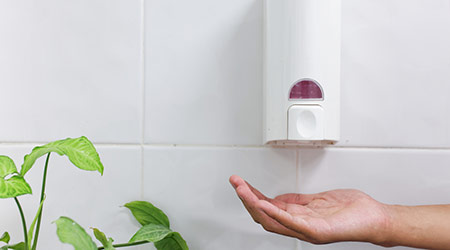Washing hands can leave them more bacteria-ridden than they were before a person washed them, according to an article from Facility Cleaning Decisions on the CleanLink website.
Several studies, led by Dr. Charles Gerba, a microbiologist at the University of Arizona, examined on the effects of using hand soap from contaminated refillable dispensers. These dispensers get refilled by pouring in new soap from bulk containers. Samples were taken from soap dispensers in a variety of public restrooms, including those found in shopping malls, office buildings and restaurants
“Certain types of bacteria will grow well in refillable-type dispensers,” said Gerba. “From what we’ve seen in several studies, 20 to 25 percent [of bulk dispensers] will have large numbers of bacteria at one time or another.”
Bacteria from the “bulk” or refillable soap dispenser will remain on the users’ hands even after using the soap, said Gerba. These include pseudomonas aeruginosa, which cause skin rash, as well as eye and ear infections, and fecal bacteria, which are very tolerant to soap.
“You get more fecal bacteria on your hands than if you stuck your hands in the toilet,” Gerba said.
Study results further demonstrated that bacteria from contaminated hands can be transferred to secondary surfaces — leading to the conclusion that washing with contaminated soap not only defeats the purpose of handwashing, but may contribute to the cross-contamination of potentially harmful bacteria.

 Healthcare Is the New Retail
Healthcare Is the New Retail Bridgeway Behavioral Health Services Launches Campaign to Renovate Health Center
Bridgeway Behavioral Health Services Launches Campaign to Renovate Health Center Ground Broken for New North Dakota State Hospital
Ground Broken for New North Dakota State Hospital AI Usage for Healthcare Facilities
AI Usage for Healthcare Facilities Ground Broken on Pelican Valley Senior Living Modernization Project
Ground Broken on Pelican Valley Senior Living Modernization Project